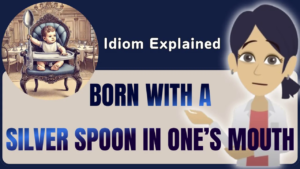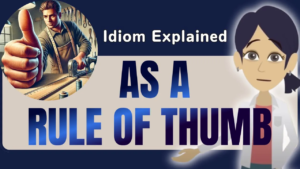Discover how a simple phrase can capture the essence of lightning-fast events!
Extremely quickly; in an incredibly short amount of time
Have you ever been caught off guard by how swiftly things can change? The English idiom “in a blink of an eye” perfectly encapsulates those moments of sudden transformation.
This figurative expression, rooted in the rapid action of blinking, is a colorful way to describe events that occur with remarkable speed.

Whether you’re a language learner or a native speaker, mastering this phrase can add vibrancy to your conversations and writing.
Let’s explore its usage, synonyms, and the cultural significance that makes it a staple in English communication.
Understanding of This Idiom
Figurative vs. Literal
The phrase “in a blink of an eye” conveys that something happens extremely quickly.
While it references the speed of blinking, it isn’t about the literal act of closing and reopening your eyelids. Instead, it captures the idea that events can occur so rapidly that you barely register the passage of time.
When someone uses this idiom, they’re emphasizing swiftness, suddenness, and the fleeting nature of a moment.
- Metaphorical Use: Think of blinking as one of the fastest reflexes we have; applying this notion to an event underlines its rapidity.
- Not Literal: You don’t have to blink for something to happen—it’s just a colorful, figurative way to highlight speed.
- Conversational Value: Native speakers often resort to phrases like this to add energy and vividness to their descriptions.
Why This Idiom Matters
If your goal is to enhance your English fluency, learning idioms like “in a blink of an eye” is invaluable. Even though the phrase is figurative, you’ll hear it in everyday speech, movies, news stories, motivational talks, and more.
By recognizing and using it correctly, you’ll develop a deeper understanding of English conversations and appear more natural when you speak.
Key Takeaways:
- Idiom Meaning: “In a blink of an eye” means something happens very quickly or suddenly.
- Significance: Commonly used to describe rapid change or unexpected events.
- Practical Examples: Scenes of fast occurrences, such as finishing tasks, disappearing objects, or instantaneous transformations.
Stories & Real Examples
Funny Misunderstanding
Sometimes, idioms are taken literally, leading to unexpected (and amusing) situations.
Imagine a language learner hearing “the meeting ended in a blink of an eye” for the first time and thinking it meant the meeting would end precisely when they blinked.
After blinking several times, they might be perplexed to see the meeting still going on! Although it’s a funny scenario, it perfectly highlights how a figurative phrase can confuse someone new to the language.
A Light-Hearted Tale
Here’s a brief story illustrating the idiom in everyday life:
- Setting the Scene: A person goes out for a morning walk with a restless dog known for its playful escapades.
- The Incident: Without warning, the dog spots a squirrel and bolts away. The owner stands there, shocked, holding an empty leash.
- The Search: Determined to find the mischievous pet, the owner combs the neighborhood, imagining all sorts of adventures the dog might be having.
- The Resolution: In a blink of an eye, the dog comes trotting back on its own, wagging its tail as if nothing happened.
- Emotional Impact: The owner experiences both relief and exasperation, realizing just how swiftly the situation changed.
This episode perfectly demonstrates how quickly events can unfold and be resolved—sometimes before you can even fully process them. Whether it’s about a missing dog or a meeting that ends abruptly,
“in a blink of an eye” captures the speed of unexpected happenings.
Practical Usage
Everyday Conversations
- Workplace: “The project wrapped up in a blink of an eye, thanks to the team’s cooperation.”
- Home: “I turned around to grab a pen, and in a blink of an eye, my toddler was out of the living room!”
- Sports: “The striker scored a decisive goal in a blink of an eye, stunning the entire crowd.”
In all these scenarios, the idiom underscores how swiftly something takes place. Whether it’s scoring, disappearing, or wrapping up a project, the phrase highlights rapid action that leaves little time to react.
Humor & Drama Effect
Using the idiom can add flair to storytelling, making listeners or readers imagine a lightning-fast transition. It’s especially useful when you want to dramatize an event or add an element of surprise.
Instead of saying, “It happened really fast,” using “in a blink of an eye” amplifies the effect.
- Dramatic Emphasis: It injects energy into your narrative, giving your words more impact.
- Memorable Impact: People often recall phrases that paint vivid images, such as blinking to convey speed.
Similar Phrases & Synonyms
Variety is the spice of language. Rather than relying on just one phrase, consider other idioms or expressions that convey similar meanings. By doing so, you enrich your language skills and avoid repetition.
Quick Expressions
- In no time: Implies completion without delay.
- Example: “He solved the puzzle in no time, like he’d done it a hundred times before.”
- In a flash: Suggests an action so swift that it feels like an instant moment of light.
- Example: “She cleaned the kitchen in a flash, leaving it spotless.”
Sudden Actions
- In a heartbeat: Emphasizes immediacy and willingness.
- Example: “I’d accept that promotion in a heartbeat if it were offered to me.”
- Before you know it: Indicates an event that comes about almost imperceptibly.
- Example: “Before you know it, the weekend is gone, and it’s back to work.”
Instantaneous Events
- In the twinkling of an eye: A classic phrase carrying the same connotation of rapid speed.
- Example: “The cookies disappeared in the twinkling of an eye, as if they vanished on their own!”
By incorporating these expressions, you can switch up your language for different contexts. The more synonyms you know, the more easily you can adapt to various conversation topics and writing styles.
Opposite Idioms
Understanding the opposite of “in a blink of an eye” helps clarify its meaning. These idioms highlight slowness or the idea of taking one’s time.
- Slowly but surely: Steady progress over a prolonged period.
- Example: “He completed the marathon slowly but surely, never giving up until he crossed the finish line.”
- Example: “He completed the marathon slowly but surely, never giving up until he crossed the finish line.”
- At a snail’s pace: Describes a notably slow speed.
- Example: “Traffic was moving at a snail’s pace this morning, so I arrived late.”
- Example: “Traffic was moving at a snail’s pace this morning, so I arrived late.”
- Drag your feet: Suggests delay due to reluctance or lack of enthusiasm.
- Example: “He tends to drag his feet when it’s time to do household chores.”
- Example: “He tends to drag his feet when it’s time to do household chores.”
- Taking one’s sweet time: Implies a leisurely or even careless approach, with no sense of urgency.
- Example: “They were taking their sweet time ordering, so the restaurant queue got longer.”
- Example: “They were taking their sweet time ordering, so the restaurant queue got longer.”
- In the long run: Focuses on a distant future outcome rather than an immediate change.
- Example: “In the long run, consistent study habits will help you master a new language.”
These expressions provide a contrasting perspective on how events unfold. Instead of happening almost instantly, they develop gradually or even painfully slowly.
Fun Facts & Culture
- Historical Usage: The phrase “in a blink of an eye” has roots stretching back centuries, highlighting that people have always been fascinated by the notion of speed.
- Universal Appeal: Many languages use similar metaphors to depict quickness, emphasizing how universal the experience of sudden change is across cultures.
- Media and Titles: Books, songs, and movies frequently include references to blinking or fleeting moments to convey drama and heightened tension.
- Sports Context: In high-speed sports, commentators often exclaim that a goal or a play happened “in a blink of an eye,” capturing the excitement of rapid action.
- Marketing: Advertisements use the idiom to stress how quickly a service can solve your problems. The sense of urgency sparks a desire to act promptly.
Pop Quiz: Check Your Idiom Skills
In a Blink of an Eye

Final Thoughts
Learning idioms like “in a blink of an eye” can significantly enrich your English skills. They not only enhance your vocabulary but also add a dash of color to your expressions.
Rather than stating something happened “fast,” you can emphasize the sheer suddenness or immediate nature of an event, giving your narrative a more engaging flavor.
Key Takeaways:
- Definition and Usage: “In a blink of an eye” means something happens with remarkable speed or suddenness.
- Figurative Language: It’s not literal; don’t expect actual blinking to trigger an event!
- Synonyms and Antonyms: Alternate phrases like “in no time,” “in a flash,” or opposites like “at a snail’s pace” help expand your linguistic repertoire.
- Practical Application: Whether describing daily life or dramatic episodes, you can use this idiom to highlight rapid changes.
By weaving this idiom into your vocabulary, you’ll convey the concept of speed more powerfully and immerse yourself in the dynamic nature of English conversation.



Keep practicing, and soon these expressions will become second nature.
After all, increasing your language skills can happen in a blink of an eye—if you embrace every opportunity to learn.









Comment